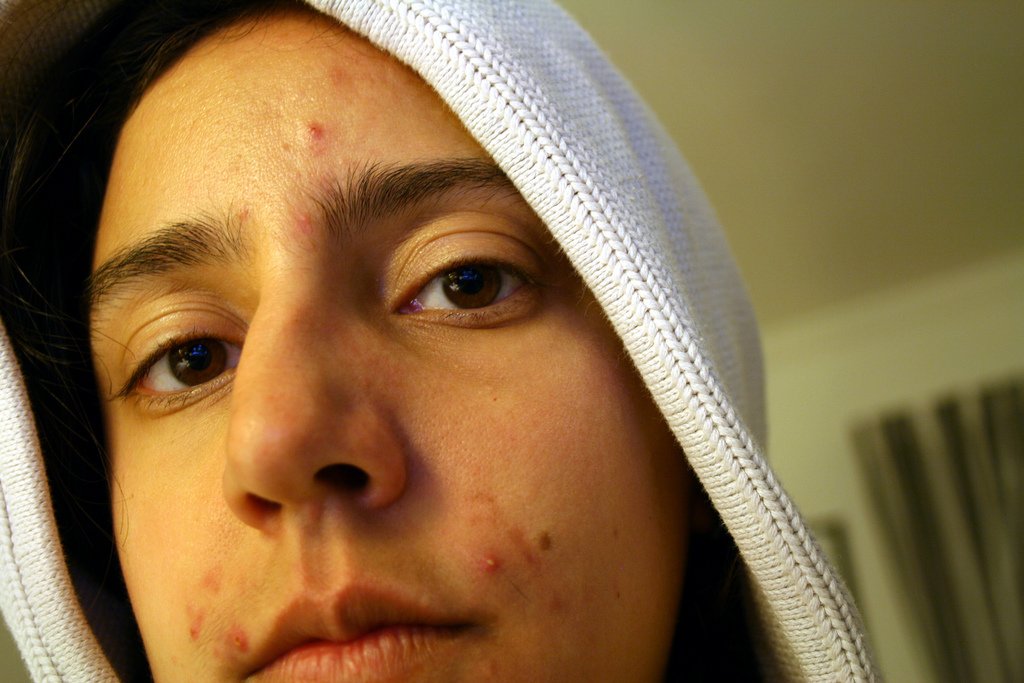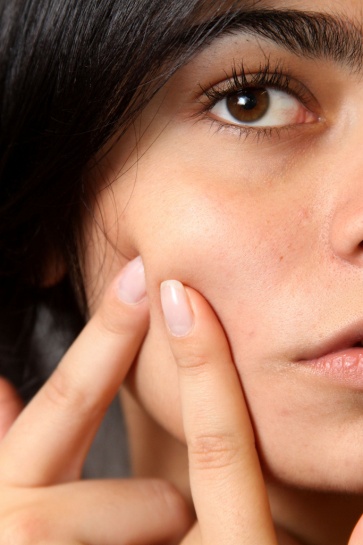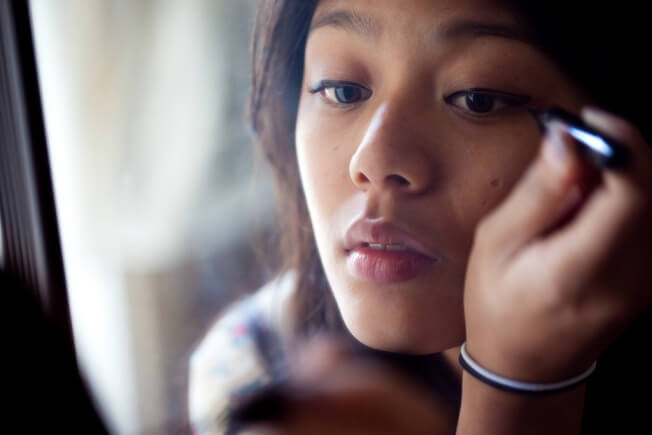Have you ever wondered why you have acne? It’s almost a silly question since no doubt nearly anyone who has ever had an acne breakout has to wonder why it has happened to them. Still, it’s a very important question to be asking because if you want to stop your acne and clear up your skin, you first need to understand why you’re getting pimples in the first place.
Unfortunately, the answer isn’t always simple. There are a lot of reasons why someone might be getting acne and that means that not every treatment option is appropriate for all cases. To clear up some of the confusion and help you understand why this is happening to you, I’ve put together this list of the top 8 causes of acne. Also, before you begin reading, it’s important to realize that there could be multiple reasons for your skin condition and not merely a single cause.
Table of Contents
Reason #1: Hormones (Especially during puberty!)
The most common cause of acne is quite simple: hormones. Specifically, increased levels of male sex hormones such as the androgen known as testosterone. Although primarily associated with men, women also produce testosterone in their ovaries (although in smaller quantities).This increase in androgens in why acne usually begins to show itself around the onset of puberty, when hormone productions increases and leads to the unwanted side effect of teenage acne.
Testosterone interacts with some naturally occurring enzymes in your body and stimulates your sebaceous glands (the oil glands in your skin), leading to increased production of an oily substance called sebum. This is the stuff that keeps your skin moist and lubricated, and when production levels ramp up during puberty it can lead to excessively oily skin. If some of your hair follicles are blocked, the oil has to where to go and is forced to form into a pimple.
Adults are not immune from hormonal acne, and this is especially true for females. During ovulation and menstruation, estrogen levels tend to drop which leads to an increase in testosterone production. This, in turn, leads to adult acne.
Reason #2: Genetics
While they may not be fully responsible, your parents may be partly to blame for your acne! It’s been debated in scientific communities and decides whether or not there was a genetic component to acne. That is: are you more likely to get acne if your parents (or grandparents) had it? Well, now it seems that the answer is a resounding yes.
According to a study published in the Journal of Investigative Dermatology in 2002 which looked at sets of female twins, there is a strong genetic component which affects one’s likelihood of getting acne.
Reason #3: Diet
This one is highly debatable, but there seems to be evidence suggesting that diet can play a role in contributing to acne. Specifically, a diet with a high glycemic load (lots of carbs!) seems to make acne worse. Cow’s milk (and other dairy products) are also known to have some effect.
With that being said, there are a lot of old wives’ tales and myths out there when it comes to the relationship between diet and acne. No, greasy pizza and chocolate are probably not going to cause you to break out. Still, it’s best to be aware of what you are eating and notice if anything seems to make your skin inflame or break out more than normal. If you notice anything like that, it’s probably a good idea to limit consumption or altogether avoid that particular food item.
Reason #4: Bacterial Infection
If you have ever gone to a dermatologist for your acne, you might know that one of the first treatment options that will usually try is to put you on an antibiotic such as tetracycline or minocycline. Have you ever wondered how an antibiotic can get rid of acne? The answer is that acne is sometimes caused by bacteria!
Propionibacterium acnes is a slow growing bacterium that has been shown to have a role in causing acne in some people. This little guy lives on your skin, and likes to consume nutrients from the fatty acids which in the sebum released by your hair follicles. If one of your pores if blocked, such as by dead skin cells, this bacteria can grow out of control and form an acne lesion.
In addition to being susceptible to antibiotics, propionibacterium acnes can also be killed with other acne treatments such as benzoyl peroxide and ultraviolet light.
It is important to realize why antibiotics are not effective at treating everyone’s acne: because Propionibacterium acnes is only one of many possible causes of acne.
Reason #5: Skin Irritation and Inflammation
So you’ve been doing everything you can to try to combat your acne: washing several times a day with a salicylic acid acne wash and scrubbing hard with a washcloth, applying 10% benzoyl peroxide, and popping every zit before it comes to a head. Despite all of this, your acne is only getting worse…why? Because you’re irritating your skin!
Many people are actually trying to hard too clear their skin, and are only hurting themselves by making the problem worse. People who experience acne, especially if it’s adult acne, usually have sensitive acne prone skin and need to treat it gently if they want to improve their acne condition.
When your skin is irritated, it tends to overreact and try to “fight back” against whatever is irritating it. This leads to more acne breakouts and more redness which can worse the appearance of existing acne lesions. Also, if your acne is caused in part by a bacterial infection (see reason #4) then you are probably spreading the bacteria around if you are squeezing and popping your pimples.
Reason #6: Makeup & Cosmetics
Sorry ladies, I know you want to look beautiful but your makeup may actually be causing your acne or at least making it worse. There is actually a special name for acne which specifically caused by cosmetic products and it’s called, not surprisingly, acne cosmetica.
According to BirthOrderPlus acne cosmetica is generally more mild than the general condition known as acne vulgaris, but it is still a problem for those who are experiencing it. Fortunately, there is hope! It’s possible to use makeup in a way that doesn’t lead to acne.
For starters, you need to make sure that anything you put on your skin, makeup or otherwise, is labeled as non-comedogenic. This basically means that it won’t clog your pores, and therefore is a good start when attempting to treat acne cosmetica. Another thing that a lot of people forget about is to clean your applicators regularly. Makeup brushes and applicators are a place where bacteria can grow, and you are then rubbing those bacteria on your skin. Yuck!
Reason #7: Stress
This is another one that is highly debated, and until recently the medical community was heavily divided on whether or not stress could be a cause of acne or not. Recently there have been some discoveries that seem to suggest that yes, stress can both lead to new acne breakouts and make existing acne conditions worse.
In 2002, a small scale study conducted by the Stanford University of Medicine concluded that student who experienced greater stress during exams also had more greatly exacerbated acne conditions.
There are some reason why this may be the case, including the fact that increased stress levels stimulate the andrenal glands to produce more of those acne causing hormones we talked about back in reason #1.
Stress also decreases the healing capacity of your immune system by up to 40%, which means that existing acne nodules will tend to stick around longer before they heal and disappear. One more thing about stress: people who are stressed out will often change their diet, possibly in ways which worsen acne symptoms.
Reason #8: Vitamin Deficiency
This one is a bit sketchy, but I thought it deserved a mention anyway. Vitamin A, several of the B vitamins, vitamin D, and even vitamin E have all been suggested as possible causes of acne. In fact, one of the most powerful and effective acne medications known as Accutane is actually derived from vitamin A.
Vitamin D is very interesting to consider as a factor in developing acne, because it isn’t actually a true vitamin at all! While when it was named it was certainly thought to be one, we now know that vitamin D is actually a steroid hormone which is produced in the skin. It’s actually known to reduce inflammation, which helps get rid of acne nodules in your skin.
Summary
So there you have it; 8 possible causes of your acne. These are only some of the more common causes, and there are certainly others which I haven’t mentioned in this article. Despite that, I hope you’ve gained some understanding as to why your skin is behaving the way it is, and that should allow you to better understand what needs to be done in order to treat your acne symptoms and get clear skin again.































